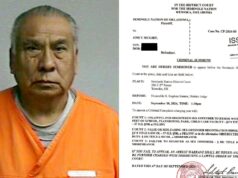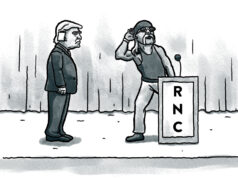Remember the old pasta sauce commercial that had lots of people asking if a certain popular sauce contained specific spices and specialty items? The tagline was, “It’s in there!”
Well, when it comes to cloture and the U.S. Constitution, “It ain’t in there!” Cloture, defined as a procedure for ending a debate and taking a vote, is a Senate rule. It has no basis in law. This arcane and useless bit of parliamentary procedure should be relegated to the dust bin of history.
Background on cloture in the modern age
Former Vice President Joe Biden used to be the Senate Judiciary Committee chairman. After bruising confirmation hearings in the 1980s (including that of Robert Bork, whose appearance created the term Borking), Biden decided to delay hearings on SCOTUS nominees during presidential campaign years.
That changed following Supreme Court Justice Antonin Scalia’s death in February 2016. At the time, then-President Barack Obama nominated Merrick Garland as his last Supreme Court nominee, and Americans would soon learn more than they ever wanted to know about cloture. A month later, Republicans invoked the Biden Rule to deny Garland entry into the nation’s highest court.
“Historically, this has not been viewed as a question,” Obama said at the time. “There’s no unwritten law that says that it can only be done on off years — that’s not in the Constitutional text.”
Neither is cloture. In fact, cloture is somewhat unconstitutional because Americans believe in a simple majority in a democratic republic. Instead, Rule 22 intended to create a supermajority vote (originally a two-thirds vote) to get something done.
Attempts to block Gorsuch ironic, petty
The argument surrounding Neil Gorsuch’s nomination to the U.S. Supreme Court brought up three interesting issues involving cloture and a related maneuver, the filibuster: The question of what’s in the Constitution, how a Supreme Court justice should evaluate the cases before them, and how to determine if the issue is constitutional or not.
The minority said Gorsuch was outside the mainstream despite the fact he earned a nearly unanimous vote to become a federal judge. They wanted to prevent what they viewed as an originalist replacement for Scalia. Conservatives differed, believing Gorsuch would interpret and decide if an issue meets the Constitutional test.
Isn’t it curious the Senate wanted to use cloture to prevent Gorsuch from being put on the court? Trying to stop a Constitutionalist using cloture? Using rules that ain’t in the Constitution to stop a Constitutionalist jurist is great irony.
Further, for Gorsuch opponents to exact some revenge for the failure of the Senate to decide on Garland is petty. Some of their motivation stems from holdover anger for the Garland kerfuffle. Other motivations came from activist pressure that Senate Democrats, still stinging from a presidential election disaster, do almost all they could to block Gorsuch.
From filibuster to cloture
In the U.S. Constitution, Article 1, Section 5 allows Congress to set up its own rules. Article 2, Section 2 refers to “Advice and Consent” of the Senate on appointments, including the Supreme Court.
Could anyone ever have envisioned cloture when the founders created this great nation? The idea came up in the early 1800s. Filibuster, from the Dutch word for “pirate”, became a way for the Senate to deny debate on an issue. Let’s see, 1850s, smack dab in the middle of the debate about slavery. At a time when the House rules limited debate, the smaller Senate had unlimited debate, so any senator should have the right to speak as long as necessary on any issue.
Cloture and Rule 22 came into stride and were adopted in 1917. The Senate used the new rule to end filibuster in 1919 regarding the Treaty of Versailles. During the next five decades, the filibuster was particularly useful to Democrat senators from the South who sought to block civil rights legislation, including anti-lynching legislation. Until cloture was invoked after a 60-day filibuster against the Civil Rights Act of 1964, the bill would be stalled. At that time there was a two-thirds vote requirement, and it was hard to get that many votes together. So the rule was changed to require only a three-fifths vote, or 60 of the 100 senators.
Although the House gave it up, the Senate has continued to use the filibuster. There are all sorts of Senate rules to invoke cloture and end a filibuster, but the biggest question citizens should ask is, “Why has this ever been allowed in the first place?” While we all remember Jimmy Stewart’s filibuster in Mr. Smith Goes to Washington (see above if you do not), that’s not what happens now. It’s merely the threat of filibuster that stops progress and decisions. Reporters and others say, “The opposite of progress is Congress!”
Let’s fix it.
Less talk, more action: Destroy Rule 22
We send lawmakers to Washington to vote, either for legislation or nominations like the Supreme Court. We then sit removed from the glow of Washington working at real jobs, trying to fix our economy and educate our children.
Then the foggy-bottom doublespeak starts. Leaders sound like the teachers in Charlie Brown cartoons. Our eyes glaze over. The Washington elites expect us to lose interest as chauffeurs whisk them away in limousines we pay for and have their minions make calls to anyone who utters a discouraging word back in the district they rarely visit anymore.
We tire of the rhetoric from those in power who sound so knowledgeable about “reconciliation” and the “mark-up” and “cloture” issues. We opine for straight talk from our elected leaders. Meanwhile, the problems of our nation remain unresolved.
We want action.
As an early supporter of then-candidate Donald Trump, it’s easy to see why he was so successful: Trump was a street fighter. There wasn’t any, “I’d like to thank my good friend from the commonwealth of …,” or, “My esteemed colleague from New York …”. He was fresher than any presidential nominee in decades. We elected him to get things done.
We the People elected Trump, and We the People no longer wait for action. We demand it. The end of Rule 22 and the media alarm over the use of “the nuclear option” was exactly what Washington needed to destroy a log-jammed process that has destroyed the people’s confidence in their elected leaders.
Congress wrote Rule 22, not God. This Congress can destroy it and rules like it. Good riddance.






















